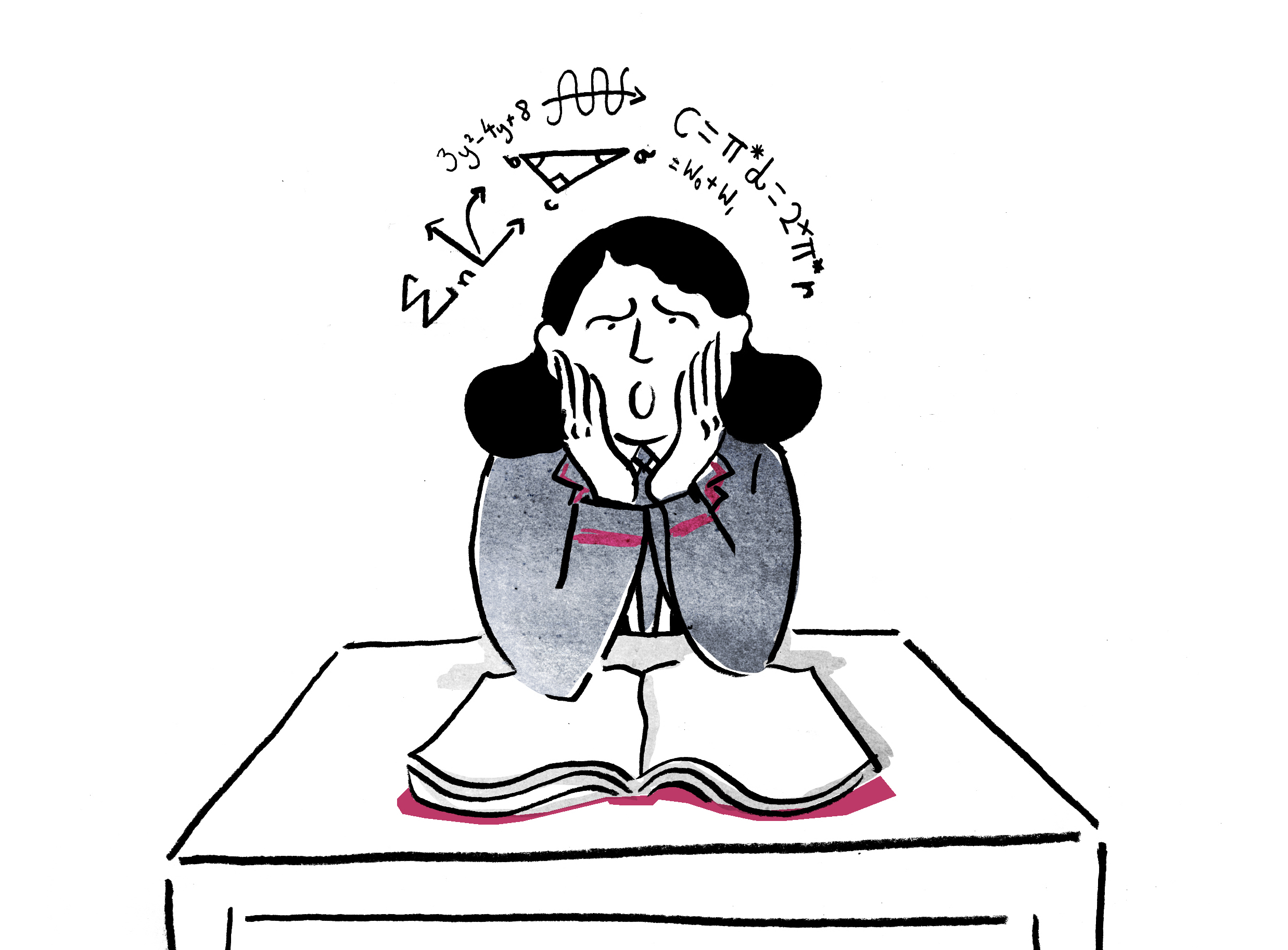When your child started their GCSEs, you might’ve thought that all kids take learn the same stuff and take the same exams come exams. Maths is Maths after all, right? Wrong. It turns out there are a handful of exam boards each with their own set of exams and marking schemes. They all have to stick to the basic curriculums set by the government, but even within that the courses can vary a fair bit. It can be quite confusing to an outsider – is it better if your teen sits AQA over OCR? Why did their school choose this paper over that one? What’s the best way they should prepare? Here we’ve answered the big questions for you, and put together a one-stop guide to everything you might want to know about Maths GCSE exams.
- What are the main boards for Maths GCSE?
- How are Maths GCSE exam papers marked?
- How do schools choose their Maths GCSE exam board?
- How do GCSE exam boards decide what questions to set?
- What do the GCSE 9-1 grade boundaries mean?
- What are the Maths GCSE Assessment Objectives?
- How are the Maths GCSE grade boundaries decided each year?
- Key dates for Maths GCSEs 2020
- Useful textbooks for Maths GCSE
- Maths GCSE past papers
- Which Maths GCSE topics do kids struggle with most?
- Maths GCSE revision tips from a tutor
1. What are the main exam boards for Maths GCSE?
The 3 major exam boards in the UK are AQA, Edexcel and OCR. They all provide exam syllabus’ for all GCSE Maths students, who are mostly around the age of 16. GCSE courses take up 2 school years to cover the content but they’re all examined at the end of those 2 years.
Edexcel
Edexcel is an internal exam board owned by a company called Pearson. Pearson Edexcel is a privately-owned board for UK syllabuses. Their name represents their key values – education and excellence.
OCR
The OCR (Oxford, Cambridge and RSA) is another top GCSE board. It releases more than 500 new GCSE papers each summer with the aim to “promote educational excellence and high-quality learning”. 90% of OCR examiners are teachers or ex-teachers.
AQA
AQA, on the other hand, set and mark over half of all GCSEs and A-levels taken in the UK every year. As an independent education charity, their income is reinvested back into charitable activities and funds research. Their principle is to support young people facing challenges in life realise their potential.
2. How are Maths GCSE exam papers marked?
99% of exam papers taken in summer exams are now marked online. This means that after a student takes an exam, examiners then download scanned exam papers and mark them on their screens.
3. How do schools choose their exam board for Maths GCSE?
There are a few deciding factors that help schools determine which exam board they will choose for each subject. One factor is the syllabus that the teachers will most enjoy teaching. Most often though, the school bases it on what they’ve taught in previous years (as that makes it easier to prepare resources) and the exam board they think will be easiest to teach and that pupils are more likely to get the best grades in.
4. How do they decide what questions to set?
With all exam boards, examiners analyse questions from previous years to ensure pupils know how to answer them easily – this helps the examiners decide which new questions to set too. Question styles for Maths GCSE vary from multiple choice, picture questions and ones in a written format, and a paper tends to have a combination of all of these. Examiners ensure that a variety of topics are covered. Papers should be similar in difficulty each year and if they are harder, then the grade boundaries will be made slightly lower for fairness.
5. What are the Maths GCSE Assessment Objectives?
Assessment Objectives are the same across all GCSE Maths boards. They are the requirements set by the government, and what markers look for when deciding how many points to give each answer.
- AO1 – Use and apply standard techniques.
- AO2 – Reason, interpret and communicate mathematically.
- AO3 – Solve problems within mathematics and in other contexts.
6. What do the GCSE 9-1 grade boundaries mean?
Below is an infographic that shows how the old A*-G grade system compares to the new 9-1. The new grading system was introduced in 2015 through to 2019 when it was brought in for all subjects. 9 is now the highest grade, and reflects a higher achievement than the previous maximum A*.
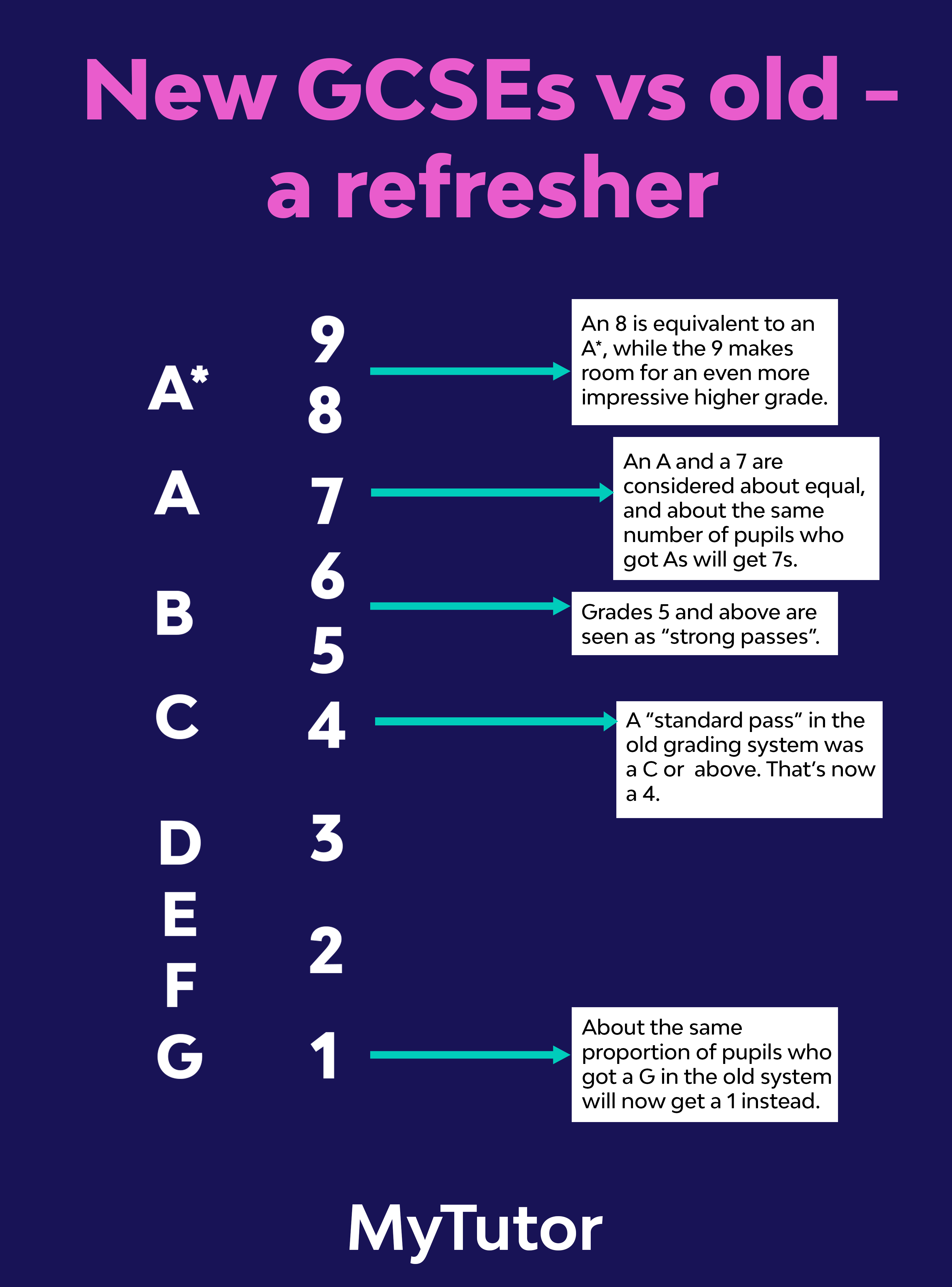

Here’s a breakdown of what candidates need to achieve in their exams to get particular exams. The guide provided by the government is quite full of jargon though, so it’s hard to understand if you’re not a teacher. That’s why we asked one of our experienced Maths GCSE tutors, Tommy, to “translate” it into plain English for you 😊Here’s what kids need to go to get an 8…
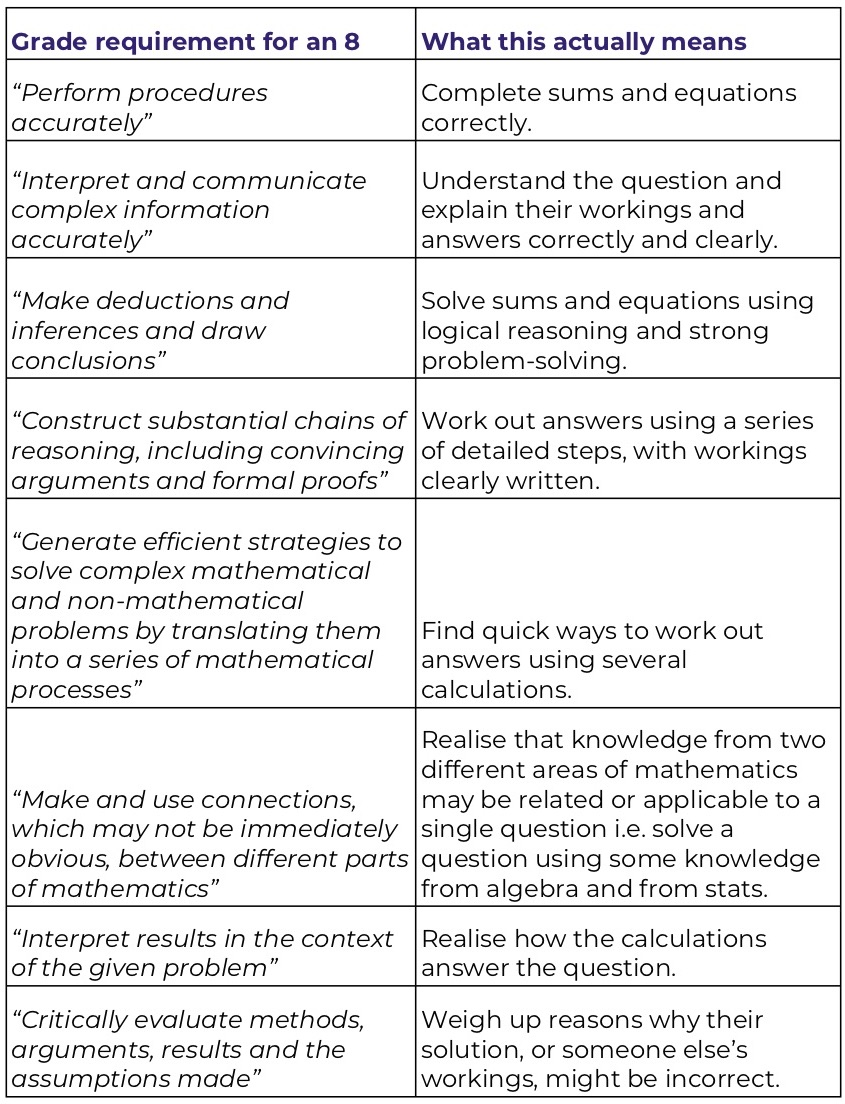

To get a Grade 5…
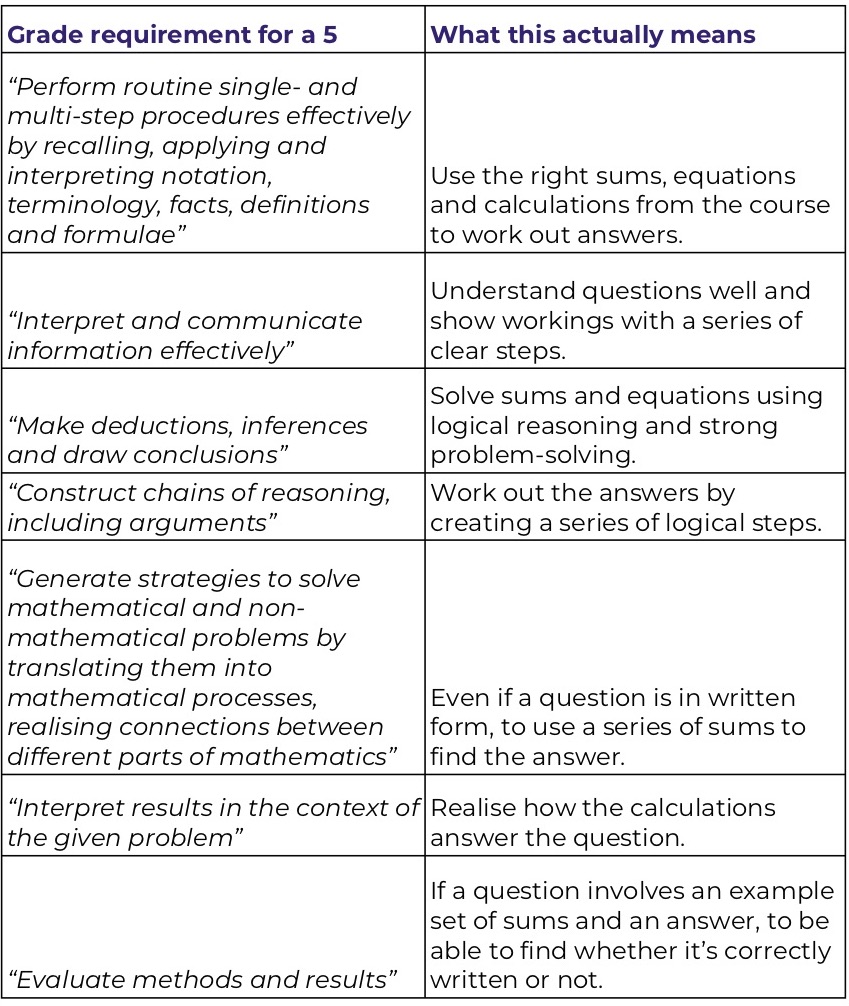

And to get a Grade 2…
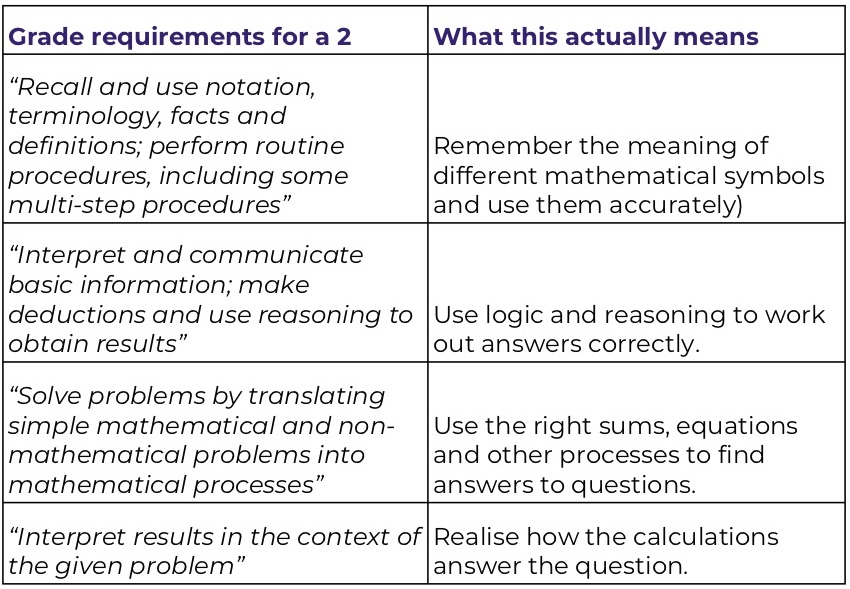

7. How are the Maths GCSE grade boundaries decided?
From year to year, examiners make sure that approximately the same number of students achieve each grade. A formula will be used that means that around 20% of all grades at 7 or above will be a grade 9, and the grade 8 boundary will be equally spaced between grades 7 and 9.
Most marking is now done by examiners looking at scanned copies of scripts on a computer screen which helps with mark standardisation. Once the scripts have been marked, the senior examiners come together to decide grade boundaries. They are decided using a combination of the examiners’ judgement and statistics. This includes comparing previous years’ papers to determine how the level of difficulty differs and looking at the students’ previous achievements.
On key grade boundaries, they also look at work by students on or around the boundaries to double check. They individually go over the test using a tick sheet to record whether a student should receive the lower or higher grade being considered.
8. Key dates for Maths GCSE exams in 2020
All exams last 1h 30mins. Schools are told whether an exam should be sat in the morning or afternoon, and they can then set the precise time for the exams to start (so they can coordinate with other subjects).
AQA:
Tuesday 19th May 2020, morning: Mathematics Paper 1 (Non – Calculator Foundation Tier)
Tuesday 19th May 2020, morning: Mathematics Paper 1 (Non – Calculator Higher Tier)
Thursday 4th June 2020, morning: Mathematics Paper 2 (Calculator Foundation Tier)
Thursday 4th June 2020, morning: Mathematics Paper 2 (Calculator Higher Tier)
Monday 8th June 2020, morning: Mathematics Paper 3 (Calculator Foundation Tier)
Monday 8th June 2020, morning: Mathematics Paper 3 (Calculator Higher Tier)
Edexcel:
Tuesday 19th May 2020, morning: Mathematics Paper 1 (Non – Calculator Foundation Tier)
Tuesday 19th May 2020, morning: Mathematics Paper 1 (Non – Calculator Higher Tier)
Thursday 4th June 2020, morning: Mathematics Paper 2 (Calculator Foundation Tier)
Thursday 4th June 2020, morning: Mathematics Paper 2 (Calculator Higher Tier)
Monday 8th June 2020, morning: Mathematics Paper 3 (Calculator Foundation Tier)
Monday 8th June 2020, morning: Mathematics Paper 3 (Calculator Higher Tier)
OCR:
Tuesday 19th May 2020, morning: Mathematics Paper 1 (Non – Calculator Foundation Tier)
Tuesday 19th May 2020, morning: Mathematics Paper 1 (Non – Calculator Higher Tier)
Thursday 4th June 2020, morning: Mathematics Paper 2 (Calculator Foundation Tier)
Thursday 4th June 2020, morning: Mathematics Paper 2 (Calculator Higher Tier)
Monday 8th June 2020, morning: Mathematics Paper 3 (Calculator Foundation Tier)
Monday 8th June 2020, morning: Mathematics Paper 3 (Calculator Higher Tier)
9. Useful textbooks for Maths GCSE
The CGP revision books use clear and concise notes to help kids learn and revise to the best of their abilities. They’re also very affordable in comparison to most. Here are some handy links:
OCR:
OCR Higher GCSE Maths Revision Guide
OCR Foundation GCSE Maths Revision Guide
AQA:
AQA Higher GCSE Maths Revision Guide
AQA Foundation GCSE Maths Revision Guide
Edexcel:
Edexcel Higher GCSE Maths Revision Guide
Edexcel Foundation GCSE Maths Revision Guide
10. Maths GCSE Past Papers
For a back catalogue of past papers for each exam board, the Maths Made Easy site is a great resource. Here are links to their inventories for each exam board:
Edexcel Maths GCSE past papers
11. Which GCSE Maths topics do students struggle with the most?
At MyTutor, we’ve got lots of dedicated GCSE Maths tutors who help teens do their best every year. They all contribute to our Study Notes resource centre, which over 1 million kids have used since we started in 2013! Here we can see which Maths GCSE questions they look for help with the most, and we’ve put together a list of example questions with answers from our tutors. This can double as a handy revision guide for your teen when they come to prepare for their exams. Read the Maths GCSE Top Topics Tutored guide here.
12. How to pass Maths GCSE – tips from our star Maths tutor, Megan:
- Make a revision checklist – this is great for organising their thoughts, ensuring their using their time effectively and rewarding themselves by ticking off revised topics.
- Check over the mark schemes from the previous GCSE exams to make sure they know exactly how to get their target grade.
- Go over past papers but then spend the time going over those questions they got wrong again to ensure they know what to do if they come up in the real thing.
- Write down or print any formulas and an areas/volumes of shapes sheet and stick this in your room so you see them every morning and evening and remember everything they need for the exams.
- Take regular revision breaks – get out of the house and go on a quick walk or run to relax their mind and make the most of their revision time.
- Make sure they get enough sleep – this is really important to keep their energy high and anxiety levels down.


Megan is one of MyTutor’s top Maths GCSE tutors. She’s currently a student at Newcastle University.
If you’d like to talk to one of our Maths GCSE tutors, have a look and send them a message, or give us a call on 0203 773 6024 📞
For more revision and study tips check out our useful blogs:
5 Secret Study Tips to help your teen
What to do the day (and night) before an exam
How to boost your teen’s confidence during exams
How to find the perfect Maths tutor
Looking for more?
Head back to our GCSE Maths revision hub for revision guides, videos and more!
